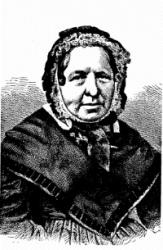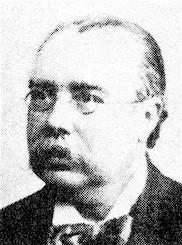
1797 - 1876 Person Name: Meta Heusser Hymnal Number: 2 Author of "Be comforted, my heart! God lives for thee" in Evangel Songs Heusser-Schweizer, Meta, daughter of Diethelm Schweizer, pastor of the Reformed Church at Hirzel near Zurich, was born at Hirzel, April 6, 1797, and was married in 1821, to Johann Jakob Heusser, a physician at Hirzel. Dr. Heusser died at Hirzel in 1859, and his widow continued to reside there till her death on January 2, 1876 (Koch, vii. 377-381; Allgemeine Deutsche Biographie, xii. 339, 340).
She was of a true poetic genius, and may fairly be regarded as the most important of modern German female sacred poets. The Holy Scriptures and the mountain scenery of her lonely home were the chief sources of her poetic inspiration. She was trained in the school of affliction, and her poems breathe the spirit of deep and sincere piety and childlike dependence, are free from all affectation, and speak from the heart to the heart. Her poems first appeared at intervals in Albert Knapp's Christoterpe. The first series of them were published at Leipzig in 1858 as Lieder einer Verborgenen; reprinted with her name as her Gedichte at Leipzig, 1863. A second series was published at Leipzig in 1867. A large number of her hymns are found in Knapp's Evangelischer Lieder-Schatz, 1850 and 1865; and in the Deutsches Gesang-Buch, 1860, of her friend Dr. Schaff, afterwards adopted as the official book of the American Reformed Church. A full selection of her poems was translated by Miss Jane Borthwick, and was published by Nelson in 1875 as Alpine Lyrics, and included as part of the new edition of Hymns from the Land of Luther, 1884. The dates of composition, unless otherwise stated, have been kindly supplied by her daughter, Fraulein Ega Heusser.
I. Hymns in English common use.
i. Herz, du hast viel geweinet. Consolation. Written in 1837, on her return from Pfäfers (Pfefiers). First published in Knapp's Christoterpe, 1841, p. 330, in 9 stanzas of 4 lines, beginning "Du hast, O Herz geweinet," as "A Floweret from Pfäfers." Repeated 1858, p. 90, and in Knapp's Christenlieder, 1841, No. 190, and Evangelischer Lieder-Schatz. 1850, No. 2060 (1865, No. 2120). Translated as:—
Long hast thou wept and sorrowed, in full, by Miss Borthwick, in Hymns from the Land of Luther, 4th Ser., 1862, p. 33. The translations of stanzas i., vii.-ix., were included in Wilson's Service of Praise, 1865, and the whole in Schaff’s Christ in Song, 1870.
Another translation is:—"Heart, thou hast long been weeping," in Reid's Praise Book, 1872.
ii. Schweige still. Consolation. Written Jan. 25, 1849, and 1st published in Knapp's Christoterpe, 1852, p. 128, in 6 stanzas of 5 lines, entitled "Be still," and repeated 1858, p. 108. Translated as:—
Heart be still! a good translation, omitting stanzas iv., in the Christian Treasury, June, 1853, p. 142. Included in the Shadow of the Rock, N. Y., 1869, and thence in full in Horder's Congregational Hymnal, 1884, and, omitting stanzas iii., iv., in W. F. Stevenson's Hymns for Church & Home, 1873.
Other translations are:—
(1) "Peace, be still! In this night," in the Christian Examiner, Boston, U.S., Nov. 1860. (2) "Peace, be still, Through the night," by Miss Borthwick, 1875, p. 94.
II. Hymns not in English common use:--
iii. Danket für alles; ihr Kinder der gottlichen Liebe. Thanksgiving . On 1 Thess. v. 18. Written April 1, 1821. First published in her Lieder, 1858, p. 117, in 9 stanzas. Translated as "Give thanks for all things, children of your God," by Miss Borthwick, 1875.
iv. Der du trugst die Schmerzen aller. Supplication. Written 1833. First published in Knapp's Christoterpe, 1835, p. 276, in 12 stanzas. Translated as "Thou hast borne our sins and sorrows," by Miss Borthwick, 1875.
v. Dunkel ists! des Lebens laute Tone. The Mother's Prayer. Written 1827. First published in Knapp's Christoterpe, 1834, p. 45, in 14 stanzas, entitled, "At midnight, by the children's bedside." Translated as "Darkness reigns—the hum of life's commotion," by Miss Borthwick, in Hymns from the Land of Luther, 1854, p. 21.
vi. Endlich, endlich, wirst auch du. Encouragement. Written 1823. First published in Knapp's Christoterpe , 1834, p. 41, in 14 stanzas. Translated as "Doubt it not—thou too shalt come," by Miss Borthwick, 1875.
vii. Hör’ich euch wieder, ihr Töne des Frühlings erklingen. Spring. This noble hymn was written in March, 1833 (1831?), after many troublous days and nights, during a journey from the snow-clad heights of Hirzel to the neighbouring Lake of Zug, where Spring had already begun. (Koch, vii. 380.) First published in Knapp's Christoterpe, 1836, p. 238, in 21 stanzas, entitled “Hymn of Praise. In early Spring amid the first songs of the birds." In the hymnals the second part, "Lamm, das gelitten, und Lowe, der siegreich gerungen" (st. x.), is given for Ascensiontide. The translations are, (1) "Voices of Spring, with what gladness I hear you again," by Miss Borthwick, in Hymns from the Land of Luther, 1862, p. 8. (2) "Lamb, that hast suffered, and Lion of Judah victorious," by Dr. H. Harbaugh, in the German Reformed Guardian, July, 1865. (3) "Lamb, the once crucified! Lion, by triumph surrounded," tr. April, 1868, by T. C. Porter, for Schaff's Christ in Song , 1869.
viii. Ich weiss, dass mein Erl'dser lebet. Consolation. Written March 20, 1859, on Job xix. 25, and included from her manuscript in Dr. Schaff’s Deutsches Gesang-Buch, 1860, in 5 stanzas (see his note there), and then in her Gedichte, 1863, p. 145. Translated as "Yes! my Redeemer lives, to save us," by Dr. H. Mills, in Schaff’s Christ in Song, 1870.
ix. Ich weiss was mien erfreuet. Joy in Believing. Written 1850, and first published in Knapp's Christoterpe, 1852, p. 132, in 8 stanzas. Translated as "I know what bringeth gladness," in the British Herald, July 1866, and in Reid's Praise Book, 1872.
x. Nun ein wenig Schweiss und Thränen. Pilgrim Song. Written 1835, and first published in Knapp's Christo-terpe, 1836, p. 244, in 5 stanzas. Translated as "A few more conflicts, toils, and tears," by Miss Borthwick, 1875.
xi. O Jesus Christ, mein Leben. Love to Christ. First published as No. 185 in the Zurich Gesang-Buch, 1853, in 6 stanzas. H. Weber, in his Das Zürcher-Gesangbuch, Zurich, 1872, p. 287, quotes from a letter of the authoress, by which it appears that about the year 1844 some of her friends wished a hymn to the fine old melody, "Esist ein Kos entsprungen." She came upon No. 1527 in Knapp's Evangelischer Lieder-Schatz, 1837, "Jesus, der ist mein Leben," recast it, and adapted it to the required metre. As the hymn is thus only partly original, she did not include it in her published works. Translated as "0 Christ, my Life, my Saviour," by Miss Borthwick, 1875, p. 69.
xii. So zieh in Gottes Frieden denn. Farewell to a Foreign Missionary. First published in Knapp's Christoterpe, 1852, p. 134, in 11 stanzas. Translated as "Now, in the peace of God," by Miss Borthwick, 1875, p. 66.
xiii. Theuer ist der Tod der deinen. Death of the Righteous. Written on the death of a friend in 1849. First published in Knapp's Christoterpe, 1852, p. 136, in 6 stanzas. Translated as "Dear to Thee, 0 Lord, and precious," by Miss Borthwick, 1875, p. 49.
xiv. "Ueber ein Kleines," so sprach erinnachtlicher Stunde. Eternal Life. Founded on St. John xvi. 16. Written 1841, and 1st pub. in Knapp's Christoterpe, 1846, p. 30, in 10 stanzas. Translated as "A little while! so spake our gracious Lord," by Miss Borthwick in Hymns from the Land of Luther, 1858, p. 22.
xv. Willkommen, lieber, lieber Tag. Easter. Written 1825. First published in Knapp's Christoterpe, 1834, p. 54, in 12 stanzas. Translated as "We welcome thee, dear Easter day," by Dr. H. Mills in 1859, printed in Schaff’s Christ in Song, 1870 (1879, p. 225).
xvi. Wir werden bei dem Herrn sein allezeit. Eternal Life. Founded on 1 Thess. iv. 17. Written 1845, and first pub. in Knapp's Christoterpe , 1846, p. 32, in 7 stanzas. The translations are, (1) “O sweet home echo on the pilgrim's way," by Miss Borthwick, in Hymns from the Land of Luther, 1858, p. 62. (2) "O blessed Voice—that Voice from Home," by Dr. R. Maguire, 1883, p. 162.
xvii. Zu deinen Fussen lass mich liegen. Cross and Consolation. Written 1865. First published in her Gedichte, 1867, p. 126, in 11 stanzas. Translated as "Low at Thy feet my spirit lies," by Miss Borthwick, 1875, p. 83.
Besides the above, many pieces have been translated by Miss Borthwick, Miss Burlingham, Rev. J. Kelly and others. Being poems rather than hymns, they are omitted from this list. [Rev. James Mearns, M.A.]
-- John Julian, Dictionary of Hymnology
Meta Heusser-Schweizer


 My Starred Hymns
My Starred Hymns





